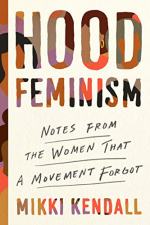|
This section contains 888 words (approx. 3 pages at 400 words per page) |

|
Hood Feminism Summary & Study Guide Description
Hood Feminism Summary & Study Guide includes comprehensive information and analysis to help you understand the book. This study guide contains the following sections:
This detailed literature summary also contains Topics for Discussion on Hood Feminism by Mikki Kendall.
The following version of the book was used to create this study guide: Kendall, Mikki. Hood Feminism: Notes From the Women that a Movement Forgot. New York: Viking, 2020.
Though her grandmother's feminism often looked different from her own, Mikki learned about the importance of intersectional feminism from her grandmother. Though the elder woman would most likely not have used those terms, Mikki nevertheless learned about the intersections of race and class, as well as how mainstream feminism has left marginalized communities out of the movement.
In "Solidarity is Still for White Women," Mikki addresses the fact that not all women are facing the same issues. Mainstream feminism needs to stop its historical legacy of prioritizing the needs of white middle- to upper-class women above all others. Power and privilege should be used to help those less fortunate rather than to further escalate one's own relative privilege. "Gun Violence" is about gun control as a feminist issue. Gun violence impacts women severely and access to firearms is a major factor in domestic violence homicides. Mikki argues that feminists need to address gun violence as a public health crisis.
In "Hunger," Mikki writes about food insecurity, poverty, and hunger which impact and individual's mental and physical health as well as often shape the types of choices they are able to make in their lives. Food insecurity should be a feminist issue as true equality cannot exist unless everyone's basic needs are met.
"Of #FastTailedGirls and Freedom" is about how the bodies of young black girls and women are hypersexualized. This problem is exacerbated through things like culturally appropriated Halloween costumes that further the objectification, commodification, and sexualization of women of color. Mikki writes a call to action that demands that those outside marginalized communities recognize and address the racialized misogyny around them and while they may be perpetuating.
"It's Raining Patriarchy" is about the sexism Mikki has experienced from within the men in her community. A more nuanced understanding of how the patriarchy manifests itself in marginalized communities is necessary because of the ways in which race and privilege intersect with sexism.
"How To Write About Black Women" is about voice appropriation, respectability politics, and tone policing. Mikki is against all of the above and wants people to stop seeking the approval of white supremacy.
In "Pretty for A...," Mikki writes about her experiences with colorism and texturism. She also writes about both the privileges and the harassment that one often experiences when one is generally considered conventionally attractive.
"Black Girls Don't Have Eating Disorders" is about how the mental health needs of women of color are often neglected and ignored. Mikki writes specifically about eating disorders and her own experience with that struggle.
"The Fetishization of Fierce" is about how society lauds women for their courage, for example when coming forward after an assault, but does little to address the root causes of those traumatic incidents. Furthermore, there needs to be a greater understanding and awareness of the consequences of coming forward.
In "The Hood Doesn't Hate Smart People," Mikki breaks down the myth that people living in poverty do not value education. Often, the lack of access to educational resources is the main issue impacting learning circumstances in marginalized communities.
"Missing and Murdered" is about the high proportion of women of color who go missing or are murdered, as well as how these crimes get let attention and resources dedicated to them as opposed to when a white woman is the victim of such a crime.
"Fear and Feminism" is about how conservative feminists often act against the interests of women, and marginalized women in particular, out of fear that they will lose their relative privilege. Women need to be aware of how their relative privilege has the power to harm others.
"Race, Poverty, and Politics" is about how poverty is impacted by politics, as well as how those living in poverty are often politically disenfranchised through gerrymandering and voter ID laws. Mikki argues for activism that will change the way white people vote and protect voting rights.
In "Education," Mikki writes about how the school-to-prison pipeline negatively impacts the lives of children of color. Police presence in school and discrimination or bullying on the part of teachers and administrators are both major issues.
"Housing" is about how the housing crisis disproportionately impacts women and needs to be considered a feminist issue. Better policies around housing are needed and housing needs to be reframed in our society as a human right.
"Reproductive Justice, Eugenics, and Maternal Mortality" is about the abortion debate and how it intersects with reproductive rights as well as eugenics and disability advocacy. In this chapter, Mikki also addresses the high maternal mortality rate in the United States and the fact that Black women are disproportionately vulnerable to maternal mortality.
"Parenting While Marginalized" is about the fact that parents of color are often viewed and treated as if they are inadequate, neglectful, or incompetent parents. Mikki writes about how the issues facing a parent from a marginalized group of often different from those who are more privileged.
"Allies, Anger, and Accomplices" is about how people can more effectively support marginalized communities by moving away from being an ally who pays lip service to a cause toward being an accomplice who takes meaningful action.
Read more from the Study Guide
|
This section contains 888 words (approx. 3 pages at 400 words per page) |

|



